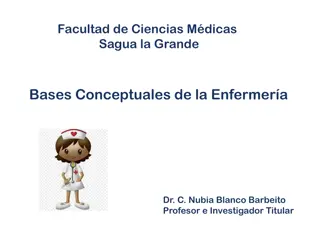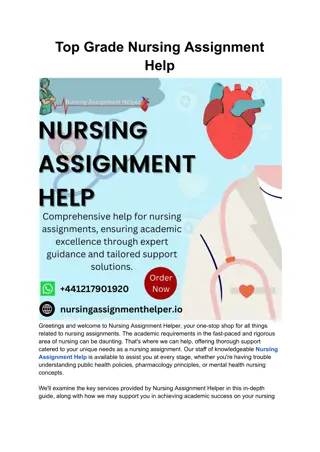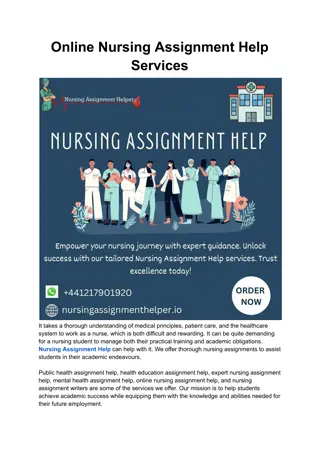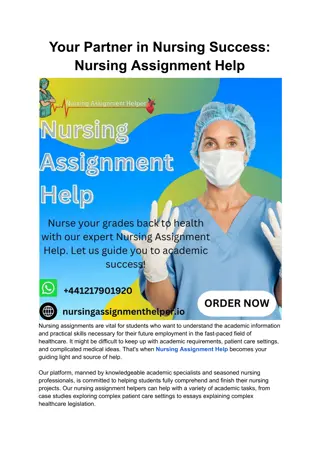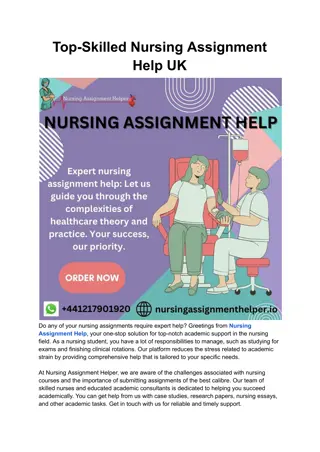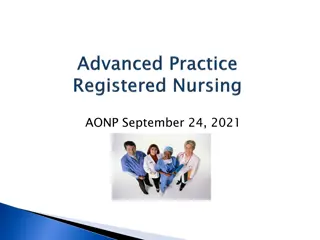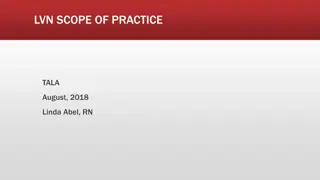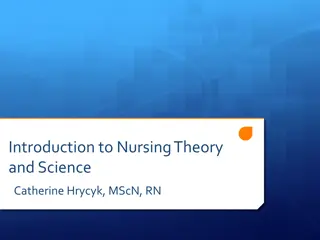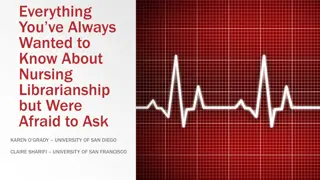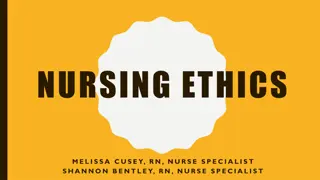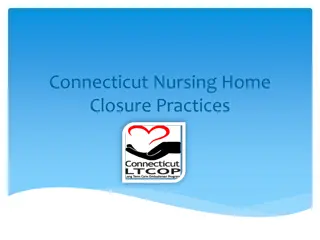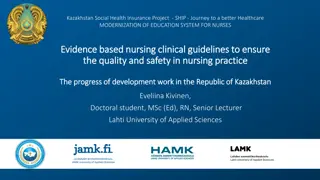Comprehensive School Nursing Practice Guidelines
Delve into the essential components of school nursing practice, covering topics like assessment, planning, implementation, and evaluation along with managing chronic diseases and life-threatening health conditions. Learn about creating Individualized Health Plans (IHPs), Emergency Care Plans (ECPs), and 504 plans, as well as staff training, delegation, and documentation. Understand the crucial steps of assessing student health needs, conducting nursing assessments, and addressing life-threatening health conditions in a school setting.
Download Presentation

Please find below an Image/Link to download the presentation.
The content on the website is provided AS IS for your information and personal use only. It may not be sold, licensed, or shared on other websites without obtaining consent from the author. Download presentation by click this link. If you encounter any issues during the download, it is possible that the publisher has removed the file from their server.
E N D
Presentation Transcript
Introduction to School Nursing MODULE II School Nurse Practice
Topics Assessment Planning Implementation Evaluation Chronic Disease Management Life-Threatening Health Conditions IHPs / ECPs / 504s Staff Training Delegation Documentation
ASSESS STUDENT HEALTH NEEDS
Nursing Assessment Health Registration Form The first step in the nursing process is to perform a nursing assessment. Gather your data: Student health information form review on every student, every year Student health record, if there from previous years Interview the student, the parent, school staff Health care provider records
Nursing Assessment Students that have an identified health condition require a thorough assessment of the students health status, history and current problems. This includes gathering information from the student, family and LHP. Quickly secure written permission from the parent/ guardian to exchange information with the LHP to facilitate the assessment. If a student requires medication or a medical treatment at school, give the parent an appropriate authorization form that provides instructions to safely manage the student s care at school.
Life-Threatening Health Conditions For students with a possible life threatening health condition, BEFORE attending school, there are 4 requirements: 1. A medication or treatment order that has been signed by the LHP and the parent must be at the school. The medication or equipment identified in the order must be at the school. A nursing plan must be in place, 4. School staff must be aware of the condition and how to respond. 2. 3. Refer to RCW 28A.210.320 and WAC 392-380-045
Life-Threatening Health Conditions Reminders: It is imperative that the RN communicate with the school administrator if it is unsafe for a student to be at school when orders, medication, supplies, care plan and necessary training are not in place. The chief administrator of each public school is responsible for exclusion.
Nursing Care Plans Following a thorough and holistic assessment, the RN identifies student health concerns and develops an individualized plan of care. Some students have: complex needs that require special care to assist them throughout the school day health conditions that present risk for health care emergency health conditions that require assistance with activities of daily living and are also at risk for an emergency event
Why Write a Care Plan for School? It is written by you---for you... it documents that you are providing the needed care for a student. It is written for teachers and paraprofessionals...so they know what the health expectations are for this student. Most of all it is written for the student... it assures them the care needed to successfully participate and be available for learning in school.
INTRODUCTION TO PLANS IHPs | ECPs | 504s
Student Plans IHPs - Individual Healthcare Plans ECPs - Emergency Care Plans IEPs - Individual Education Program 504 Student Accommodation Plans Introduction to School Nursing: 8/13/2019
Individualized Health Plan (IHP) Written by the RN to direct care for students. Based on a nursing assessment and developed for a student s daily management of their health condition. Can either be a broad, comprehensive plan that addresses the holistic student needs or a brief plan. Based on a nursing assessment and developed for a student s daily management of their health condition. A living document that may need revisions as the students health status changes. Video IHP Overview: https://youtu.be/7sKqOtIBYrU
Generic Individual Health Plan Student Demographic Info Primary Diagnosis Problem List Hospitalization History Allergies Medications Equipment Medical History Review of Body Systems Pacer Center: https://www.pacer.org/health/pdfs/ind_health_plan.pdf Introduction to School Nursing: 8/13/2019
Emergency Care Plan (ECP) Clear instructions, written in lay language, to guide unlicensed assistive personnel (UAP) when responding to a health emergency. Ensure access to staff who will use it. Serves as documentation of actions. Provide copies to EMS and hospital to support communication.
Emergency Care Plan: Asthma Ellicottville Central Schools, New York Introduction to School Nursing: 8/13/2019
504 Plan 504 Plans list accommodations in school to ensure that a student has access to a free and appropriate education (FAPE) experience. Students who may qualify for a 504 plan may be having their needs met through the IHP. In this case the 504 accommodations would be incorporated into the IHP.
Model 504 Plan: Epilepsy Template for individualized content 8 page plan that includes accommodations, field trips, emergency evacuation, etc. Epilepsy Foundation Introduction to School Nursing: 8/13/2019
Components of IHP/ECP/504 Plan Diagnosis/Condition History-severity, frequency, time of last episode Triggers Symptoms Treatment intervention/s for condition Accommodations All medications student takes All known allergies Health care provider-hospital Signatures
Who Signs the Care Plan? RN: An RN signature is required on all care plans. LHP: Indicates accuracy to assure plan is what LHP expects. Required if medications or treatments are ordered. Parent/Guardian: Indicates accuracy and clarifies expectations of how school will respond in an emergency and indicates that RN is partnering with the family to formulate the plan. Required if medications or treatments are ordered. Student: Indicates that the student is an active part of the care team and sets the stage for the student taking responsibility for their health care
Care Plan Checklist Checklists are useful to track progress as you develop and implement IHP/ECP/504 Plans
Life-Threatening Health Conditions ANAPHYLAXIS | ASTHMA | DIABETES | SEIZURES
Communication and Planning It is critical to partner with the student s parent, not alienate the parent. Communicate needs clearly to Superintendent. Focus on student safety concerns, not license concerns . Plan ahead for medical emergencies and emergency transportation, including air evacuation support.
ANAPHYLAXIS Is a life-threatening allergic reaction that involves 2 or more body systems Is a medical emergency requiring immediate medical treatment with activation of Emergency Medical Services (EMS) Refer to: OSPI Manual Guidelines for Care of Students with Anaphylaxis
Common Causes Peanuts Tree Nuts Milk Eggs Crustacean Shellfish Wasps / bees Medication Latex Wheat Soybeans
ANAPHYLAXIS GUIDELINES The school district is responsible for the development of an individualized emergency care plan by an RN. Plan components must include: Training school staff on identifying the problem and their role A plan to inform staff that need to know Strategies to reduce the risk of exposure to the allergen Dietary prescriptions Refer to: RCW 28A.210.380; RCW 28A.21o.370
Stock Supply Epinephrine Auto-Injectors If an LHP with prescriptive authority writes an order for stock epi use in a school setting, the school may maintain stock epi injector pen(s). Schools must follow state guidelines and restrictions on allowable number of injectors, storage and administration. School nurse or designated trained school personnel may utilize the school district or school supply of stock epi for students with a prescription. Only the school nurse may utilize a school s stock epi for students without a prescription. If the school nurse is not available, unlicensed school staff should immediately call 911. Refer to: RCW 28A.210.383
Asthma Guidelines Policies regarding asthma rescue procedures, including authorization for self administration of asthma medication. LHP-prescribed medication and instructs student in correct use. Student demonstrates proper technique to the school nurse for administration of med. Refer to: RCW 28A.210.370
Asthma Guidelines Student s parent/guardian provides medication. Medication authorization and IHP/ECP/504 must be renewed each year. Medication authorization and plans are effective only for the SAME school and school year. A student may self-carry and self-administer asthma medication at school and school sponsored events when parent, nurse and principal agree that it can be done safely.
Asthma Considerations Students with asthma may qualify for 504 accommodations. Students with both asthma and anaphylaxis need integrated plans to ensure both conditions are appropriately managed. If back-up med is provided, it must be kept in a location that the student has immediate access to. A student may self-carry and self-administer asthma medication with a written treatment plan for self-managing asthma episodes
Asthma & Anaphylaxis A dual diagnosis of asthma + anaphylaxis greatly increases risk of death. Care plans must clearly state that the student has 2 diagnoses - asthma + anaphylaxis .
Diabetes For children with diabetes to be successful in school, a comprehensive health plan must be cooperatively developed by families, school personnel, and the LHP. Refer to: 2018 OSPI Manual: Guidelines for Care of Students with Diabetes
Diabetes Guidelines An IHP should be in place in the student s school and should include provisions for: Parental signed release of health information. Parental signed consent for treatment at school form. Medical equipment and storage capacity. Exceptions from school policies. School schedule. Meals and eating. Disaster preparedness. Inservice training for staff. Legal documents for PDAs if needed. Personnel guidelines describing who may assume responsibility for activities contained in this plan. Refer to: RCW 28A.210.330 to 350
Diabetes Planning Packet Sample Forms: Planning Checklist Diabetes History form ECP for hypoglycemia and hyperglycemia 504 Plan including consent form Exchange of Information Parent Designated Adult (PDA)
Diabetes PDA PDA A volunteer, who may be a school district employee, who receives additional training from a health care professional or expert in diabetic care selected by the parents, and who provides care for the child consistent with the IHP. To be eligible to be a PDA, a school district employee shall file, without coercion, a voluntary written, current, and unexpired letter of intent stating the employee's willingness to be a PDA. If a school employee chooses not to file a letter, the employee shall not be subject to any employer reprisal or disciplinary action for refusing to file a letter.
Seizure Guidelines Requirements for the care of students with life threatening seizures are addressed in: RCW 28A.210.260 Public and Private School Administration of Medication RCW 28A.210.320 Children with Life-threatening Health Conditions Resources: Epilepsy Foundation NCQAC Registered Nurses Coordination Seizure Management
NCQAC Guidance on Seizures In the schools setting, registered nurses are responsible for the coordination of care for students with seizure disorders. They collaborate with family members, health care providers in the community, and other licensed and unlicensed assistive personnel to create individualized plans for care. NCQAC Registered Nurses Coordination Seizure Management
Seizure Plan Development Develop IHP/ECP/504 including: Seizure history Triggers Seizure classification Medication/Devices Acuity level Personnel available and willing to carry out IHP/ECP/504
Seizure PDA RCW 28A.210.260 allows parents to designate an adult (PDA) to provide seizure care consistent with the student s IHP. The PDA is a volunteer who receives additional training from a healthcare professional or expert in epileptic care, selected by the parent/guardian. To be eligible to be a PDA, a school district employee shall file, without coercion, a voluntary written, current, and unexpired letter of intent stating the employee's willingness to be a PDA.
Implementation Steps Staff Training to Care Plan Delegation Documentation of Delegation Distribute Care Plan to Staff

 undefined
undefined






 undefined
undefined




